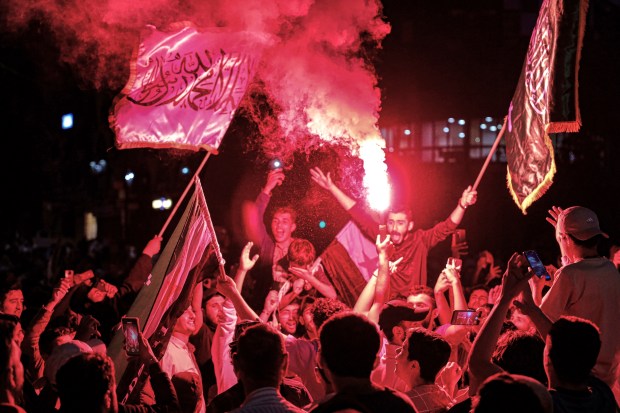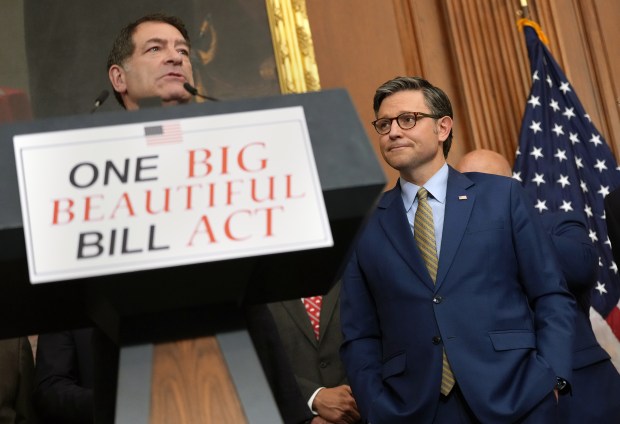Next Sunday, football fans will be gathering for the Super Bowl, and the Chicago Bears will be watching from the sidelines — again. The Bears haven’t played in a Super Bowl since 2007, a loss, and haven’t won it since the previous time they played almost 40 years ago.
The past year was a disaster: After rebuilding for two unwatchable seasons, the Bears supposedly had a winning culture in place to go with an upgraded roster. Instead, the team was badly exposed. For the first time in Bears history, the team fired its head coach during the season, cementing its reputation as a perennial loser.
Hope springs eternal this time of year, and the Bears have teed up a highly touted new coaching staff. But the rest of the organization remains largely unchanged. The dysfunction that has led to failure year after year could easily lead to failure again.
In a blunt assessment of Ryan Poles’ three-year tenure as general manager, the Tribune’s Dan Wiederer quoted a former football executive who said the Bears’ problems go from top to bottom, starting with an offensive coordinator who was such a bust that he lasted only nine games before being ousted.
A successful team needs its coordinators, head coach, GM, president and owners to work together smoothly, the executive said. “The argument could be made that they were 0-for(-5) in that regard as far as having people and structures in place that were proven in any way.”
Zero-for-five? Ouch.
The Bears clearly have work to do, and the lesson for fans is to resist the hype this year, but don’t give up hope, either.
As bad as the Bears have been, other organizations have overcome losing cultures. Just look at the Detroit Lions, bigger losers than the Bears over past years and last year one of the best teams in the league, despite a disappointing playoff performance against the Washington Commanders.
What have the Lions got that the Bears haven’t got? For starters, accountability. From individual players on up through the chain of command, everyone working for the Bears needs to be held responsible for the team’s faults, including bad hires, bad draft picks and bad free-agency decisions.
The Lions have a coach in Dan Campbell who goes overboard to take the blame when things go wrong. The Bears? Not recently. But at least the team has tapped a new head coach from the Lions, so maybe Detroit’s magic will rub off.
The Bears need to eliminate internal conflicts between players, coaches and executives. Key leaders like quarterback Caleb Williams and head coach Ben Johnson need to set good examples and hold others to a high standard. Bad teammates can poison a locker room, and in a long stretch of games last year the Bears looked like a team that expected to lose.
As for the executive staff, making hard decisions is essential. Cutting a popular player, coach, scout or fellow executive can seem cold-hearted, but it is necessary for long-term success. Everyone in the building needs to be evaluated skeptically, from trainers and equipment managers to security guards and spin doctors in the public relations department.
A bit of luck would help, too, and despite a losing record, the Bears have had some good luck. A trade with the Carolina Panthers turned into a bonanza for the team, netting it the talented Williams at quarterback, as well as a star receiver and valuable draft picks. Poles has done a good job managing the Bears’ payroll, keeping the team under a league-imposed salary cap, so the potential exists for a quick turnaround.
If these basic steps toward building a winning culture sound familiar, they should. To succeed, practically any organization needs accountability, teamwork, smart decision-making and, yes, an occasional stroke of luck. And as with any organization, winning starts at the top. Just like a corporate chief executive, a big-city mayor or a college president, a team owner must understand what it takes to succeed.
The Bears’ McCaskey family is well-intentioned, and far from the worst owners in the NFL’s checkered history, but it was telling when fans confronted them at Soldier Field last year with the chant, “Sell the team! Sell the team!”
There’s no evidence that the McCaskeys plan to sell their majority stake in the team. But the NFL made a change last year that could be tempting for a family that has so many of its financial eggs in one basket — and may need to shoulder a big bill for a new stadium.
Last summer, the owners of the NFL’s 32 teams approved rules that for the first time permit private-equity investors to purchase minority stakes. The McCaskeys were among the 31 owners who voted in favor of the rules. And while that vote doesn’t mean a change in the ownership structure is coming, it at least means a change could come.
Bears fans can only watch and wait — and hope — while the Chiefs (again) and the Eagles compete in the Super Bowl on Feb. 9.
Sign up for the Opinion newsletter: Get the latest editorials and commentary curated by the Chicago Tribune’s opinion team sent to your inbox each weekday.
Submit a letter, of no more than 400 words, to the editor here or email letters@chicagotribune.com.




